January 19, 2017 •
Thursday Government Relations News Roundup
Lobbying “The Trump Lobbying Purge That Wasn’t” by Maggie Severns and Isaac Arnsdorf for Politico Colorado: “Denver City Council Committee Stalls Vote Again on Ethics Changes” by Jon Murray for Denver Post Massachusetts: “Could Lobbying Rules Have Saved Boston from […]
 Lobbying
Lobbying
“The Trump Lobbying Purge That Wasn’t” by Maggie Severns and Isaac Arnsdorf for Politico
Colorado: “Denver City Council Committee Stalls Vote Again on Ethics Changes” by Jon Murray for Denver Post
Massachusetts: “Could Lobbying Rules Have Saved Boston from Ill-Fated Grand Prix?” by Andrew Ryan for Boston Globe
Missouri: “House Passes HB 60 to Limit Lobbyist Gifts” by Benjamin Peters for Missouri Times
South Dakota: “Senators Reluctantly Allow Lobbyists to Stay” by Dana Ferguson for Sioux Falls Argus Leader
Campaign Finance
“SEC Settles with 10 Public Fund Money Managers Over Pay-to-Play Violations” by Hazel Bradford for Pensions & Investments
Ethics
South Carolina: “Lt. Gov. Henry McMaster Paying Off Ethics Penalties Before Becoming Governor” by Andy Shain for Charleston Post & Courier
Texas: “State Rep. Dawnna Dukes Indicted by Grand Jury” by Alex Samuels for Texas Tribune
Elections
Kansas: “Kobach Seeks Authority for Bifurcated Elections; Downplays Issue of Missing Registrations” by Peter Hancock for Lawrence Journal World
Legislative Issues
“How a Mother-in-Law Inspired a Bill to Protect Drivers” by Cleve Wootson Jr. for Washington Post
January 18, 2017 •
Ethics Bill Passes Missouri House
Ethics reform legislation passed the Missouri House Tuesday afternoon with wide bipartisan support. House Bill 60 would prohibit lobbyists and lobbyist principals from making expenditures for state public officials or for their staff, spouses, or dependent children. An exception would […]
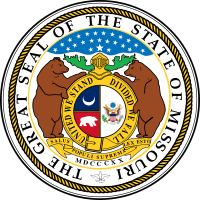 Ethics reform legislation passed the Missouri House Tuesday afternoon with wide bipartisan support.
Ethics reform legislation passed the Missouri House Tuesday afternoon with wide bipartisan support.
House Bill 60 would prohibit lobbyists and lobbyist principals from making expenditures for state public officials or for their staff, spouses, or dependent children.
An exception would remain for event expenditures if all members of the Legislature or all statewide officials are invited in writing. For clarity, the bill would subsequently remove any unnecessary lobbyist reporting requirements.
The bill now moves to the Senate for consideration.
January 18, 2017 •
Identification Badges Required for Alabama Lobbyists
According to a memorandum from the Alabama House Bill Clerk, lobbyists and state agency representatives will be issued identification badges. After registering with the Ethics Commission, a lobbyist or state agency representative must sign up with the Alabama House to […]
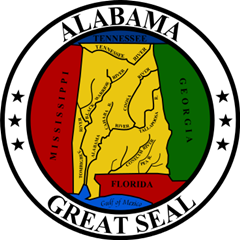 According to a memorandum from the Alabama House Bill Clerk, lobbyists and state agency representatives will be issued identification badges.
According to a memorandum from the Alabama House Bill Clerk, lobbyists and state agency representatives will be issued identification badges.
After registering with the Ethics Commission, a lobbyist or state agency representative must sign up with the Alabama House to receive the new badges.
Badges may be acquired by calling House Bill Clerk Dildred Bass at (334) 242-7616, or in-person at Bass’s office located in the Alabama State House, Office of the Clerk, Room 504-B.
January 18, 2017 •
South Dakota Senators Decide Not to Restrict Lobbyists
The Senate Committee on Legislative Procedure decided to table consideration of a proposed new rule to ban lobbyists from the chamber and adjacent hallways during working hours. The measure came up for a vote yesterday and the committee voted unanimously […]
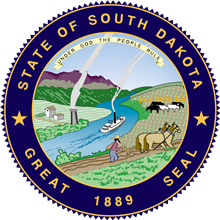 The Senate Committee on Legislative Procedure decided to table consideration of a proposed new rule to ban lobbyists from the chamber and adjacent hallways during working hours.
The Senate Committee on Legislative Procedure decided to table consideration of a proposed new rule to ban lobbyists from the chamber and adjacent hallways during working hours.
The measure came up for a vote yesterday and the committee voted unanimously to let the lobbyists stay. Lawmakers could decide to reconsider adoption of the proposal any time during the legislative session.
January 18, 2017 •
Wednesday Government Relations News Roundup
Lobbying Michigan: “From Lawmaker to Lobbyist. Should the State Slow Down the Revolving Door?” by Craig Mauger and Ted Roelofs for Bridge Magazine Campaign Finance California: “La Jolla Car Dealer Sentenced for Role in Funneling Illegal Contributions to San Diego […]
 Lobbying
Lobbying
Michigan: “From Lawmaker to Lobbyist. Should the State Slow Down the Revolving Door?” by Craig Mauger and Ted Roelofs for Bridge Magazine
Campaign Finance
California: “La Jolla Car Dealer Sentenced for Role in Funneling Illegal Contributions to San Diego Mayor’s Race” by Greg Moran for San Diego Union Tribune
Ethics
“Trump’s Cabinet Pick Invested in Company, Then Introduced a Bill to Help It” by Manu Raju for CNN
Arkansas: “North Little Rock Attorney Says No Ethics Violation in Dallas Cowboys Tickets Given to Police Officers” by Jake Sandlin for Arkansas Online
Iowa: “Kent Sorenson Sentenced to 15 Months in Prison for Role in Caucus Scandal” by Grant Rodgers for Des Moines Register
New Mexico: “Will Independent Ethics Oversight Catch On in 2017?” by Trip Jennings for New Mexico In Depth
Pennsylvania: “DA Williams Fined $62,0000 for Ethics Violations” by Claudia Vargas for Philadelphia Inquirer
Virginia: “Lengthy New Ethics Bill Targets Redskin Tickets Loophole” by Travis Fain for The Daily Press
Elections
“Rolling in the Red Carpet: Many Pennsylvania Avenue firms to ignore Trump parade” by Stephanie Mansfield for Washington Times
January 17, 2017 •
Texas Legislators Push for Ethics Reform
Legislators will attempt to pass a major ethics reform for the second time after their effort during the 2015 legislative session failed. The plan gained wide spread support in 2015 but was ultimately defeated in the House due to a […]
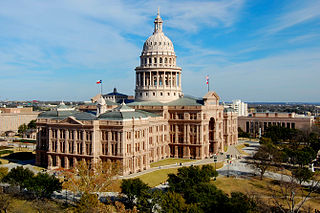 Legislators will attempt to pass a major ethics reform for the second time after their effort during the 2015 legislative session failed. The plan gained wide spread support in 2015 but was ultimately defeated in the House due to a provision increasing donor disclosure requirements for dark money groups.
Legislators will attempt to pass a major ethics reform for the second time after their effort during the 2015 legislative session failed. The plan gained wide spread support in 2015 but was ultimately defeated in the House due to a provision increasing donor disclosure requirements for dark money groups.
The new reform package, Senate Bill 14, has four main provisions to:
- Prohibit politicians convicted of felony corruption charges from collecting state pensions
- Require disclosure if companies a lobbyist is tied to have received government contracts or served as bond counsel to a governmental entity
- Decrease the amount of money lobbyists can spend on food and drinks for legislators without triggering disclosure
- Ban registered lobbyists from running for elected office
Sen. Van Taylor who is sponsoring Senate Bill 14 has said reform is needed beyond the provisions of the reform package and will continue to file additional ethics bills. While Senate Bill 14 has not yet been filed, Taylor has filed Senate Bill 137 aiming to prohibit state agencies from using state funds to employ a person who is registered as a lobbyist or who engages in lobbying activities.
Gov. Greg Abbott supports the passage of an ethics package.
Photo of the Texas State Capitol By LoneStarMike via Wikimedia Commons
January 17, 2017 •
Several Ethics Bills Introduced in New Mexico
New Mexico lawmakers have recently introduced several ethics bills. House Bill 119 would make it unlawful for a state legislator or legislative candidate to solicit or accept a contribution, even absent any political purpose. House Bill 73 seeks to create […]
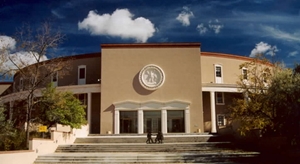 New Mexico lawmakers have recently introduced several ethics bills.
New Mexico lawmakers have recently introduced several ethics bills.
House Bill 119 would make it unlawful for a state legislator or legislative candidate to solicit or accept a contribution, even absent any political purpose.
House Bill 73 seeks to create a two-year revolving door provision prohibiting former statewide elected officials, public regulation commissioners, legislators, and cabinet secretaries from accepting compensation as lobbyists for a period of two years after terminating their service. The bill would also prohibit a lobbyist employer from compensating any of the aforementioned persons during the two-year period.
State Sen. Daniel A. Ivey-Soto introduced Senate Bill 72, also known as the Public Accountability Act (PAA). If passed, the PAA would create the Public Accountability Board (PAB) with enforcement powers over the compliance provisions of various public acts including, but not limited to, those related to campaign finance reporting, lobbying, public accountability, ethics, and procurement.
The PAB would serve as an adjunct agency with the secretary of state, members of the board of commissioners of the state bar, the governor, and the chief justice of the supreme court each appointing three members, respectively. Among its provisions, the act amends the definition of lobbyist and prohibits lobbyists and government contractors from serving on the PAB. If passed, several of the sections would be effective as soon as July 1, 2017, while the PAB would not gain enforcement powers over many of the listed acts until July 1, 2019.
January 16, 2017 •
Florida House Considering Constitutional Amendment to Prevent Revolving Door
A proposed amendment to the Florida Constitution seeks to slow the revolving door between public officials and lobbyists. Currently, members of the legislature, statewide officials, and appointed officials must wait two years before lobbying on behalf of a principal. The […]
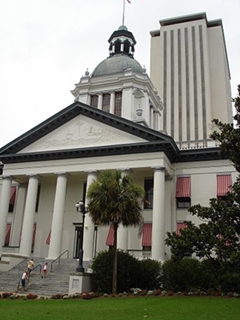 A proposed amendment to the Florida Constitution seeks to slow the revolving door between public officials and lobbyists.
A proposed amendment to the Florida Constitution seeks to slow the revolving door between public officials and lobbyists.
Currently, members of the legislature, statewide officials, and appointed officials must wait two years before lobbying on behalf of a principal.
The amendment, PCB 17-01, would extend the cooling-off period to six years. The change, proponents say, would prevent officials from ingratiating themselves to lobbyists in hopes of landing a high paying position after leaving office.
The amendment is being considered by the House Public Integrity and Ethics Committee and will be voted on at the Committee’s next meeting.
January 16, 2017 •
Washington State Lawmakers Introduce Ethics Bills
Lawmakers in Washington have introduced two bills to enhance campaign finance disclosure and ethics laws. Senate Bill 5108 aims to increase transparency of “gray money” by limiting political action committees from receiving 70 percent or more of their contributions from […]
 Lawmakers in Washington have introduced two bills to enhance campaign finance disclosure and ethics laws.
Lawmakers in Washington have introduced two bills to enhance campaign finance disclosure and ethics laws.
Senate Bill 5108 aims to increase transparency of “gray money” by limiting political action committees from receiving 70 percent or more of their contributions from other political committees.
Another proposal, House Bill 1159, seeks to establish revolving door provisions requiring former state officials to take a yearlong “cooling-off” period before they can become lobbyists.
January 16, 2017 •
South Dakota Senators to Consider Measure to Restrict Lobbyists
The Senate Committee on Legislative Procedure is considering a new rule to ban lobbyists from the chamber and adjacent hallways during working hours. The committee is expected to reconvene tomorrow for a vote on the proposal. If adopted, Senate President […]
 The Senate Committee on Legislative Procedure is considering a new rule to ban lobbyists from the chamber and adjacent hallways during working hours.
The Senate Committee on Legislative Procedure is considering a new rule to ban lobbyists from the chamber and adjacent hallways during working hours.
The committee is expected to reconvene tomorrow for a vote on the proposal. If adopted, Senate President Pro Tempore, Brock Greenfield, would have the authority to implement the new measure.
January 16, 2017 •
Monday Government Relations News Roundup
Lobbying Florida: “NRA’s Influence with Florida Lawmakers Is Powerful” by Steve Bousquet (Tampa Times) for Bradenton Herald Campaign Finance “Trump Tweet About L. L. Bean Underscores Potential Danger for Brands” by Daniel Victor for The New York Times California: “State […]
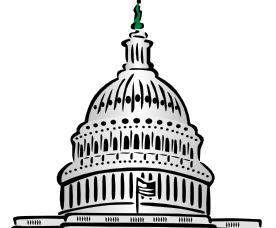 Lobbying
Lobbying
Florida: “NRA’s Influence with Florida Lawmakers Is Powerful” by Steve Bousquet (Tampa Times) for Bradenton Herald
Campaign Finance
“Trump Tweet About L. L. Bean Underscores Potential Danger for Brands” by Daniel Victor for The New York Times
California: “State Watchdog Agency Investigating after Times Report on Political Donations” by Emily Alpert Reyes and David Zahniser for Los Angeles Times
District of Columbia: “In a City Plagued by Pay-to-Play Politics, an Important Decision Looms for D.C.” by Aaron Davis for The Washington Post
Washington: “Lawmakers in Olympia Seek New Campaign-Disclosure and Ethics Rules” by Joseph O’Sullivan for Seattle Times
Ethics
“After Trump Rebuke, Federal Ethics Chief Called to Testify Before House Lawmakers” by Lisa Rein, Tom Hamburger, and Mike DeBonis for The Washington Post
Maryland: “Democrat Michael Vaughn of Prince George’s Resigns from State Legislature” by Ovetta Wiggins for The Washington Post
Montana: “Republican Lawmakers Try to Cut Off Campaign Regulator’s Pay” by Matt Volz (Associated Press) for SF Gate
Tennessee: “House Lawmakers Must Disclose Political Junkets” by Joel Ebert for The Tennessean
Texas: “Top House Republican Says Dark Money Debate Won’t Kill Ethics Reform” by Jay Root for Texas Tribune
January 13, 2017 •
NYCU Video Digest – January 13, 2017
See what’s happening in government relations this week in our News You Can Use Video Digest. Enjoy!
See what’s happening in government relations this week in our News You Can Use Video Digest. Enjoy!
January 13, 2017 •
NY A.G. Schneiderman to Hold Off Enforcing Donor Disclosure Requirements
According to the American Civil Liberties Union (A.C.L.U.) and New York Civil Liberties Union (N.Y.C.L.U.), Attorney General Eric Schneiderman will not enforce certain provisions of the ethics law passed in 2016. Specifically, Schneiderman is holding off on enforcing provisions of […]
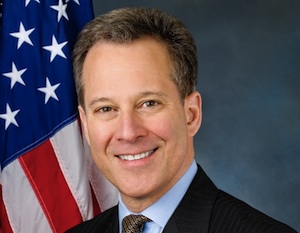 According to the American Civil Liberties Union (A.C.L.U.) and New York Civil Liberties Union (N.Y.C.L.U.), Attorney General Eric Schneiderman will not enforce certain provisions of the ethics law passed in 2016.
According to the American Civil Liberties Union (A.C.L.U.) and New York Civil Liberties Union (N.Y.C.L.U.), Attorney General Eric Schneiderman will not enforce certain provisions of the ethics law passed in 2016.
Specifically, Schneiderman is holding off on enforcing provisions of the New York Executive Law related to charitable lobbying donations (N.Y.E.L §172-e, f) until a federal lawsuit is decided. Schneiderman and officials from the Joint Commission on Public Ethics are both listed as defendants in the lawsuit filed by the A.C.L.U. and N.Y.C.L.U.
Plaintiffs contend the law requiring 501(c)(3) charities to disclose all their donors who contributed more than $2,500 to a substantial lobbying campaign run by an issue-oriented 501(c)(4) is unconstitutional and they are seeking an injunction prohibiting enforcement the ethics law.
January 13, 2017 •
News You Can Use Digest – January 13, 2017
National: Russian Hackers Find Ready Bullhorns in the Media New York Times – Max Fisher | Published: 1/8/2017 Reporters have always relied on sources who provide critical information for self-interested reasons. The duty is to publicize information that serves the public interest without […]

National:
Russian Hackers Find Ready Bullhorns in the Media
New York Times – Max Fisher | Published: 1/8/2017
Reporters have always relied on sources who provide critical information for self-interested reasons. The duty is to publicize information that serves the public interest without falling prey to the source’s agenda. But in 2016, the source was Russia’s military intelligence agency – operating through shadowy fronts who worked to mask that fact – and its agenda was to undermine the American presidential election. By releasing documents that would tarnish Hillary Clinton and other U.S. political figures, but whose news value compelled coverage, Moscow exploited the very openness that is the basis of a free press.
Federal:
DOJ Watchdog Opens Review of Comey’s Clinton Email Investigation
Politico – Josh Gerstein | Published: 1/12/2017
The Justice Department’s internal watchdog will investigate FBI Director James Comey’s decision to publicly release information about the bureau’s investigation into Hillary Clinton’s handling of classified material. The inquiry by the department’s inspector general will focus on whether “policies or procedures were not followed” when Comey held a July 5 news conference to discuss the case, and when he sent letters to Congress just before the election that disclosed his agents were reviewing newly discovered emails pertinent to the Clinton case. Some in Clinton’s campaign blamed Comey’s actions for halting her momentum shortly before the election and helping in Donald Trump’s presidential victory.
How a Sensational, Unverified Dossier Became a Crisis for Donald Trump
New York Times – Scott Shane, Nicholas Confessore, and Matthew Rosenberg | Published: 1/11/2017
As they prepared to brief President Obama and President-elect Donald Trump on Russian interference in the 2016 election, U.S. intelligence officials decided to mention the salacious allegations that Moscow had compromising information on the incoming president. That triggered coverage of allegations that news organizations had tried to run down for months but could find no basis for publishing until they were summarized and included alongside a classified report assembled by the nation’s intelligence services. Parts of the story remain out of reach – most critically the basic question of how much, if anything, in the dossier is true. But it is possible to piece together a rough narrative of what led to the current crisis, including lingering questions about the ties binding Trump and his team to Russia.
Trump Won’t Drop Business Ties
Politico – Josh Dawsey and Darren Samuelsohn | Published: 1/11/2017
Donald Trump, insisting he will not divest himself of his vast business empire as he prepares to assume the presidency, plans instead to turn over all of his business operations to a trust controlled by his two oldest sons and a longtime associate. He will donate to the U.S. government all profits from foreign government payments to his hotels. The Trump Organization will also refrain from entering into any new deals with foreign partners, backing off from an earlier claim by Trump that his company would have “no new deals” of any kind during his presidency. The business will have to clear any new transactions with an ethics adviser. The moves fell short of the recommendations of ethics experts who have said the only way for Trump to genuinely eliminate potential conflicts is to place all his real estate holdings and other ventures in a blind trust over which neither he nor his family has any control.
From the States and Municipalities:
California – How This Former Aspiring Screenwriter Became One of California’s Campaign Finance Experts After Losing His Day Job
Los Angeles Times – Christine Mai-Duc | Published: 1/9/2017
Three years ago, Rob Pyers was as far away from politics as one could imagine: a college dropout who had been laid off from his job, binge-watching Netflix to pass the time. Today, from his one-bedroom apartment in West Hollywood, Pyers anchors one of the most trusted compendiums on state politics and is becoming the ultimate insider in the often-opaque world of campaign finance. His passion for organizing massive amounts of data has transformed the California Target Book and made his Twitter feed a go-to resource for some of Sacramento’s top operatives.
California – L.A. Politicians Propose Banning Campaign Contributions from Developers
Los Angeles Times – David Zahniser and Emily Alpert Reyes | Published: 1/10/2017
A group of Los Angeles City Council members proposed banning contributions to council campaigns from developers with projects currently or recently before the city. The motion also would consider whether to expand the city’s definition of developer to include building contractors and subcontractors, and whether to increase the enforcement staff at the city Ethics Commission to ensure more frequent audits and inspections. With the council approval of the motion, it is now up to the ethics panel and other city staff to craft implementing ordinances to bring back to the council in coming months.
Colorado – Denver Council Approves Gift-Report Rules That Require More Frequency, Better Access
Denver Post – Jon Murray | Published: 1/9/2017
The Denver City Council voted in favor of requiring more frequent reporting, more detail, and easier-to-access records of the meals, tickets, and most other gifts they receive from donors with a city interest. The new rules replace a system of annual reporting in which those gifts and other financial disclosures were not viewable by the public until seven months after the end of the reporting period, and could be obtained only by visiting the clerk’s office and paying for copies. The ordinance was one of three ethics measures considered by the council in recent months. It approved another proposal that will make lobbyists’ registrations and bimonthly reports of spending on city lobbying activities available online.
Connecticut – CT’s Largest Lobbying Firms Led by Women
HartfordBusiness.com – Patricia Daddona | Published: 1/9/2017
Paddi LeShane is an equal partner with Patrick Sullivan running Connecticut’s third largest lobbying firm – Sullivan & LeShane Inc. – with 47 registered clients. But she is not the only high-profile woman lobbyist running her own shop. In a profession long-dominated by men, women operate three of the five largest lobbying firms in Connecticut, based on number of registered clients, and their presence at the Capitol is growing. In fact, women lobbyists are far from an anomaly in the government relations field these days, industry experts say.
Kentucky – Report: Beshear officials shook down 16 workers
Louisville Courier-Journal – Tom Loftus | Published: 1/11/2017
Kentucky Gov. Matt Bevin’s investigation of former Gov. Steve Beshear’s administration has found state employees were solicited for campaign contributions both during and after working hours. The investigators interviewed 16 non-merit employees from six departments in the Beshear administration. Witnesses said “virtually all non-merit employees” in the executive branch were expected to make a financial contribution, according to the report. Kentucky law forbids specifically targeting state employees for campaign donations, unless the solicitation is part of a larger plan that includes non-state employees.
Maryland – Federal Bribery Charges Filed over Prince George’s County Liquor Licenses
Washington Post – Lynh Bui, Ann Marimow, and Arelis Hernandez | Published: 1/5/2017
Federal investigators disclosed that two Maryland lawmakers, one now out of office, are targets of a public corruption probe and expected to be charged in a bribery scheme that already has resulted in charges against two Prince George’s County liquor board officials and two business owners. The two lawmakers were unnamed in federal affidavits that outlined a bribery conspiracy in which officials were paid for favorable liquor license actions. Among those charged were David Dae Sok Son, the liquor agency’s administrator. Son solicited and facilitated bribes ranging from $1,000 to $5,000 from lobbyists and business owners, according to prosecutors. It is alleged that Son facilitated payments to an elected official for help moving a business to the county and grants the official controlled.
Massachusetts – City Hall Promised Lobbying Reform. Nothing Happened.
Boston Globe – Mark Arsenault and Andrew Ryan | Published: 1/9/2017
A year after Boston Mayor Martin Walsh promised that regulations governing municipal lobbyists would be a priority, no plan has been approved. Since February, the initiative has sat untouched in a city council committee without a hearing. Wash and council leaders may have said they supported new lobbying rules, but it appears none of them made an effective effort to follow through. That means corporations and interest groups continue to employ lobbyists to quietly influence city government with practically no public scrutiny.
Missouri – Missouri Attorney General Josh Hawley Announces New Ethics Policy
Kansas City Star – Jason Hancock | Published: 1/10/2017
Missouri Attorney General Josh Hawley banned his employees from accepting gifts from lobbyists. Hawley also will not accept campaign contributions from anyone who has a pending bid or application for state contract on which the attorney general’s office has decision-making authority. The new ethics policy comes one day after Gov. Eric Greitens signed an executive order banning state workers in the executive branch from accepting lobbyist gifts. It is unclear whether Greitens’ order is actually enforceable.
New York – AG Will Hold Off on Enforcing Parts of Lobbying Disclosure Law
Albany Times Union – Chris Bragg | Published: 1/12/2017
New York Attorney General Eric Schneiderman will not enforce certain parts of a new state ethics law requiring charitable organizations that give money to lobbying campaigns to disclose more of their donors while a federal lawsuit moves through the courts. One provision that is affected would require 501(C)3 charities to report their sources of funding when the group makes an in kind contribution or donation in excess of $2,500 to a 501(c)(4). The other provision mandates 501(c)(4) groups that spend more than $10,000 a year on any public policy communications report the name and address of donors who give $1,000 or more.
Pennsylvania – Calls Turn Developers into Donors for Peduto
Pittsburgh Post-Gazette – Rich Lord | Published: 1/8/2017
Pittsburgh Mayor Bill Peduto is making a bid for a second term, with no announced challenger. Like incumbents past, he has filled a campaign account in part by collecting from people who do business with the city. Pittsburgh’s top development official has asked developers to contribute to Peduto’s campaign, in a series of calls the administration contends were devoid of deal-making, but which others said are at odds with the spirit of reform the mayor once championed.
South Carolina – Merrill Indictment Casts Pall Over Opening of SC Legislature
The State – Avery Wilks | Published: 1/9/2017
As the South Carolina Legislature reconvenes, the top issues will include fixing the state’s roads and addressing an underfunded pension system. But a corruption investigation will cast a pall over the proceedings, raising a host of other issues. Two indictments during the past month mean the Republican-controlled Legislature will start its session without a pair of GOP legislators. Rep. Chris Corley was suspended after he was indicted on criminal domestic abuse charges. Rep. Jim Merrill was suspended after he was indicted on charges of using his public office to pocket at least $1.3 million from outside interest groups. Watchdogs say the behavior alleged in Merrill’s indictment is not all that unique at the statehouse and more indictments could be on the way.

State and Federal Communications produces a weekly summary of national news, offering more than 60 articles per week focused on ethics, lobbying, and campaign finance.
State and Federal Communications, Inc. provides research and consulting services for government relations professionals on lobbying laws, procurement lobbying laws, political contribution laws in the United States and Canada. Learn more by visiting stateandfed.com.

